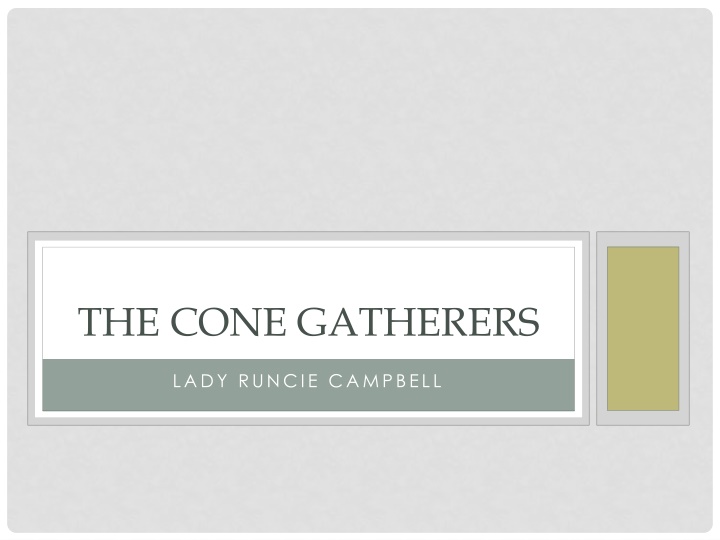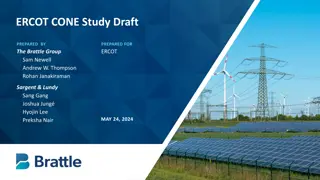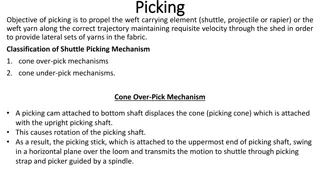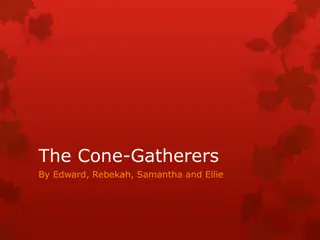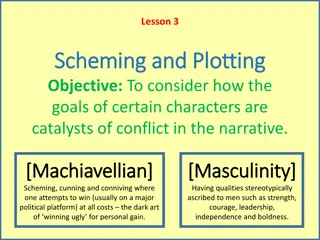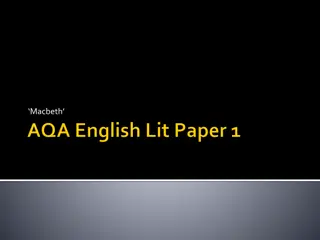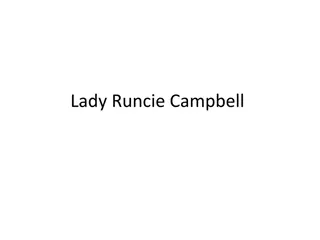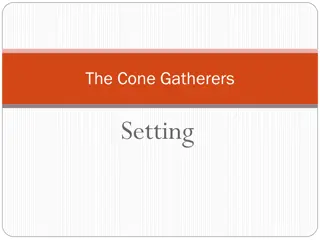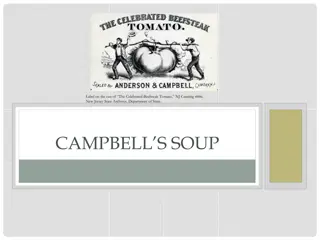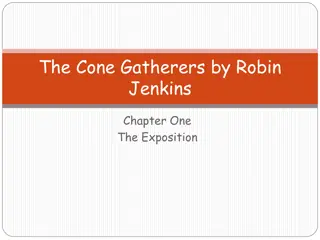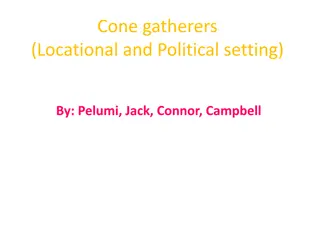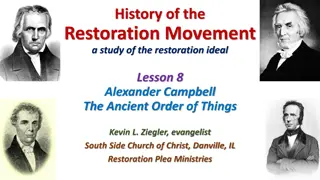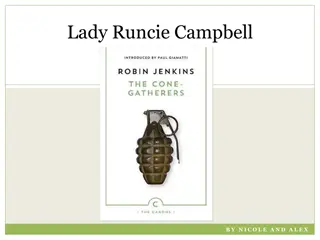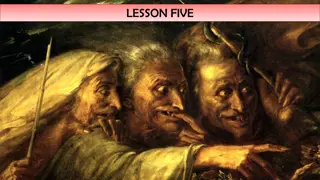Analysis of Lady Runcie Campbell's Character and Conflicts in "The Cone Gatherers
Lady Runcie Campbell, a complex character in "The Cone Gatherers" by Lady Runcie Campbell, is a woman of beauty, earnestness, and passion for justice. However, her conflict between social class, pride, and Christian values becomes evident as she grapples with issues of morality and privilege. This analysis delves into her character traits, key conflicts, and how they contribute to the central themes of the novel.
Download Presentation

Please find below an Image/Link to download the presentation.
The content on the website is provided AS IS for your information and personal use only. It may not be sold, licensed, or shared on other websites without obtaining consent from the author.If you encounter any issues during the download, it is possible that the publisher has removed the file from their server.
You are allowed to download the files provided on this website for personal or commercial use, subject to the condition that they are used lawfully. All files are the property of their respective owners.
The content on the website is provided AS IS for your information and personal use only. It may not be sold, licensed, or shared on other websites without obtaining consent from the author.
E N D
Presentation Transcript
THE CONE GATHERERS LADY RUNCIE CAMPBELL
CHARACTERISATION Lady Runcie Campbell is the wife of a baronet, who, due to her husband being away at war, is in charge of the family estate. Main points about her character as introduced on page 41: She is very beautiful, but also possesses earnestness of spirit - meaning that she is sincere and wants to do the right thing. She is a member of the ruling class but she has a passion for justice, profound and intelligent; and a determination to see right done, even at the expense of rank or pride . Her husband says there is a contradiction between her emulation of Christ and her eminence as a Baronet s wife She would have given Neil and Calum the use of the beach hut if Duror had not dissuaded her. ( She is easily influenced)
CONFLICT The point written in red on the previous slide is very important because: It is the basic conflict which is absolutely central to her character. We see this in the first key incident involving her in Chapter 4- her meeting with Duror. The conflict: She wants to have the deer drive and she sees absolutely nothing wrong with shooting deer. It is part of her heritage and is sacred to her, but she is told by Mr Tulloch that Calum should be allowed not to take part because of his feelings about Nature.
THE OUTCOME After the two phone calls between her and Mr Tulloch, she asks for Duror s advice, and he cleverly manipulates her into saying that Calum must take part. Evidence of her conflict: She thinks that Calum s objections are abnormal , frivolous and callow (immature). She would not force anyone to act against their principles ( shows her desire to do right) but then says I cannot recognise principle in this case. ( Her pride in her own views being right, because she is of the ruling class.)
THEME This incident, and the characterisation of Lady Runcie Campbell, convey one of the main themes of the novel- Conflict between social classes. How does it do so? Because she is upper class, she feels that her views must be right, and refuses to consider that someone like Calum could have views of his own.
CHAPTER SIX- THE DEER DRIVE What evidence is there in this key incident of Lady Runcie Campbell s conflict between pride/ position and Christian values? Pride/ Position She feels the deer drive has been made dreadfully sordid because of what Calum did. She does not seem to blame Duror.(p72) She sees Calum as the culprit for spoiling the drive- says so when she sees Duror looking at him with hatred She wants to send Neil and Calum away because she has been subjected to humiliation on her own land.(p77)
DOING THE RIGHT THING Roderick points out to her that she is being unfair, and that she taught him to speak up if he saw injustice being done. ( He is like her conscience here) Mr Tulloch says that he sees no fault in the men Her brother refuses to say that he is upset by it Even then Is it not enough that I wish them to go she said haughtily. So she does not see that she is in the wrong. Her social position is dictating her feelings and actions.
LADY R.C/ RODERICK Lady Runcie Campbell contrasts with Roderick, who sees no conflict between social position and doing right by others. What evidence is there? Chapter Eight, when Roderick says hello to the cone gatherers, and then suggests giving them a lift back to the estate. His mother is astonished , but also fond and proud when he speaks to them. Well, aren t you the complete democrat. But don t overdo it please. (p91) She is worried that Roderick does not see things as a baronet s heir should , and that her Christian views have corrupted him.
RODERICK AGAIN Lady Runcie Campbell wants to rebuke Roderick for his naivety, and at the same time try to preserve his charitable attitude towards his inferiors. Roderick does not see them as inferiors, just as people, and sees that the men are not treated fairly.
LADY RUNCIE CAMPBELLS THOUGHTS Page 111: She sees herself as unworthy because she did not listen to Roderick about giving Neil and Calum a lift. She understands the problem: To obey Christ by being humble must mean to betray her husband, and also, perhaps, to amuse her equals. This clearly sums up her conflict.
CHAPTER ELEVEN A key event for three reasons: helps us to see the character of Lady Runcie Campbell more clearly Conveys the theme of class conflict and also links directly to the climax of the novel.
WHAT HAPPENS? Neil and Calum, rather than be caught in the fierce storm, which could be very dangerous for them, have sought shelter in the beach hut. Calum is reluctant to go because he thinks The lady will be angry Neil is angry (p126): He says Haven t we got a right to keep ourselves alive? Is the lady like the rain and the thunder and the lightning, that we should be forced to flee from her as well? This hut s never used. When the war is over they are going to pull it down and build a new one.
LADY RUNCIE CAMPBELLS REACTION When she enters the beach hut and sees Neil and Calum there, she shouts What is the meaning of this? . When Calum speaks she says For God s sake! and recoiled from him, as if from something obnoxious Once they have left she speaks to her children about them and what she will do.
CONTINUED P130: Look at what she says: I shall certainly see to it that they don t stay long in the woods after this. This week will be their last I never heard of such impertinence. She had to laugh to express her amazement. Your father s right. After this war the lower orders are going to be frightfully presumptuous. She thinks of Calum and Neil as being absolutely beneath her, and worthy only of her contempt. She thinks that it is absolute cheek that they dared to enter the hut. There is no sign of Christianity in her here. (Theme of class conflict.)
THE FIRE Neil and Calum have lit the fire- something else that she thinks is insolent- but she and her children are getting the benefit. This is symbolic of the class system: the lower classes do all the work- the upper classes get the benefit. Lady Runcie Campbell does not see that Neil and Calum have any rights at all, because of their class.
CHAPTER THIRTEEN In this chapter lady Runcie Campbell tries to justify to herself, and to Roderick, the actions which she took towards Neil and Calum. She tells him how he has to understand his position in society, (p142) and can no longer be innocent . She explains how the class system works, and how he has to understand how to have the right attitude towards people of a lower class. She says (ironically)that people like them ought never to be arrogant or overbearing .But that is not to say we must regard everybody as our equal
CHAPTER THIRTEEN This shows us that Lady Runcie Campbell is only Christian in her attitudes when it suits her. What she really wants is for everything to just stay the same- for her to be superior to everyone else. She decides to do what her husband ( who represents the ideas of the upper classes) would do, and send Neil and Calum away.
CHAPTERS 15 & 16 CLIMAX AND ENDING Roderick climbs the tree he admires the cone gatherers he cannot get down LRC acts calmly and decisively At one point however she turns on Harry as she thinks he implied cowardice (extreme insult in aristocratic society) She needs the cone gatherers help but Neil demands she ask herself She is appalled at the idea but decides to go
THE ENDING- CHANGE IN LADY R.C. It is she who finds Calum s body She goes down on her knees among the blood and cones She cannot pray but she can weep As she weeps pity and joy and hope well up in her heart The fact she decided to go to the cone gatherers is a great concession for her The ending shows she has learnt a lesson about rank and Christianity
